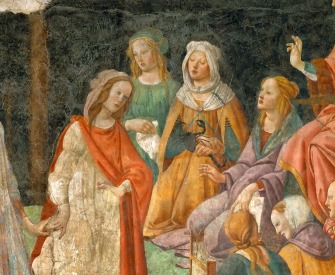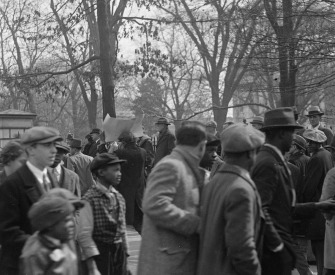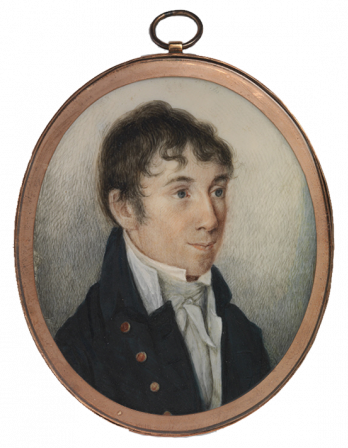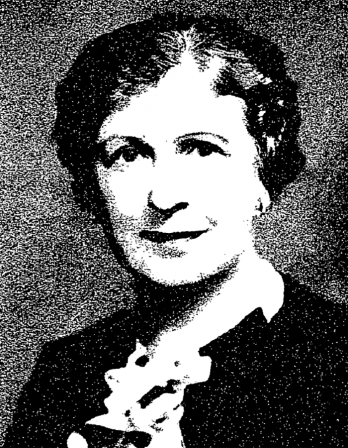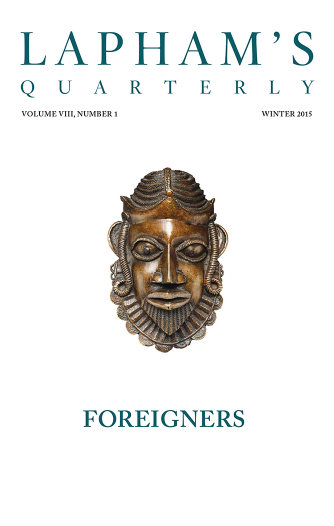Every communist must grasp the truth: “Political power grows out of the barrel of a gun.”
—Mao Zedong, 1938
“President John F. Kennedy conferring with former President Harry S. Truman in the Oval Office, on Kennedy's first full day in the White House,” photograph by Abbie Rowe, 1961. National Archives and Records Administration, Office of Presidential Libraries.
By all outward appearances, Abraham Lincoln was one of our least electable presidents. Tall and thin, with a long torso and big ears, his arms flailed when he spoke, and his voice was “not melodious,” but instead “shrill and piercing.” One friend said that “he provoked as much laughter by the grotesque expression of his homely face as by the abstract fun of his stories.” In the way he spoke, his carriage, his uncontrollable expressions, and his “shrill” voice, Lincoln was, according to modern TV-ready requirements, decidedly unpresidential. But what he lacked in physical appeal—it was an eleven-year-old girl who first suggested he grow a beard—he put right with words. Abraham Lincoln was funny.
Laced with a Southern accent, Lincoln’s stories and jokes reflected his rural, homespun education. According to Judge David Davis, Lincoln’s humor was:
In many respects unique, if not remarkable. His countenance and all his features seemed to take part in the performance. As he neared the pith or point of the joke or story, every vestige of seriousness disappeared from his face. His little gray eyes sparkled; a smile seemed to gather up, curtainlike, the corners of his mouth; his frame quivered with suppressed excitement; and when the point—or “nub” of the story, as he called it—came, no one’s laugh was heartier than his.
In 1848, as a young representative from Illinois, Lincoln took the House floor in support of the Whig presidential candidate, Zachary Taylor. He mocked his Democratic opponents for not gathering behind a single candidate by telling a curious anecdote:
I have heard some things from New York, and if they are true, we might well say of your party there, as a drunken fellow once said when he heard the reading of an indictment for hog stealing. The clerk read on till he got to, and through the words, “did steal, take, and carry away, ten boars, ten sows, ten shoats, and ten pigs” at which he exclaimed, “Well, by golly, that is the most equally divided gang of hogs I ever did hear of.” If there is any gang of hogs more equally divided than the Democrats of New York are about this time, I have not heard of it.
When Lincoln finished with a remark, wrote Ralph Waldo Emerson, “He looks up at you with a great satisfaction, and shows all his white teeth, and laughs.”
Lincoln had an ear for entertaining, collecting anecdotes like the drunken hog-stealing tale and keeping them at the ready to make a point. “I remember a good story when I hear it,” he said, “but I never invented anything original. I am only a retail dealer.” We should perhaps take the comment as something of a dissemblance. It is difficult to imagine who else could have originated this snide remark in a letter to Gen. George B. McClellan, his eventual opponent in the 1864 election, when the general failed to advance against the Confederacy with the speed Lincoln would have liked: “If you don’t want to use the army, I should like to borrow it for a while.”
Although many of the jokes attributed to Lincoln are of questionable authenticity—when accused of lying he reportedly said, “If I were two-faced, would I be wearing this one?”—his public humor was well-recorded in his 1858 debates with Stephen Douglas. Lincoln attacked Douglas’ position, which would have allowed each state to decide on the future of slavery, as an argument “as thin as the homeopathic soup that was made by boiling the shadow of a pigeon that had starved to death.” Douglas later admitted that while he felt he was a match for Lincoln’s arguments, “there is one thing, however, of which I stand constantly in dread. When Lincoln begins to tell a story, I begin to get apprehensive. Every one of his stories seems like a whack upon my back—that is exactly the effect that the allegories and anecdotes, of which he is a master, have upon me.” Lincoln’s humor allowed him to connect with the audience in a way Douglas never could. Lincoln was a man of the people, and his humor reflected a shared experience. Douglas had reason to be wary—he had lost to Lincoln sixteen years earlier when they both courted Mary Todd—but Lincoln’s performance at the debates was not sufficient to stop Douglas’ reelection to the Senate. The national exposure, however, helped him win the White House two years later.
During his presidency, Lincoln suffered from depression, deepened by the deaths of his mother and older sister and by the Civil War. He tried to keep his darker moods out of public view, leading even his most dedicated supporters such as Richard Henry Dana to wonder, “Can this man Lincoln ever be serious?” When asked how he liked being president, Lincoln replied jokingly, and honestly, “You have heard the story, haven’t you, about the man who was tarred and feathered and carried out of town on a rail? A man in the crowd asked him how he liked it. His reply was that if it was not for the honor of the thing, he would much rather walk.”
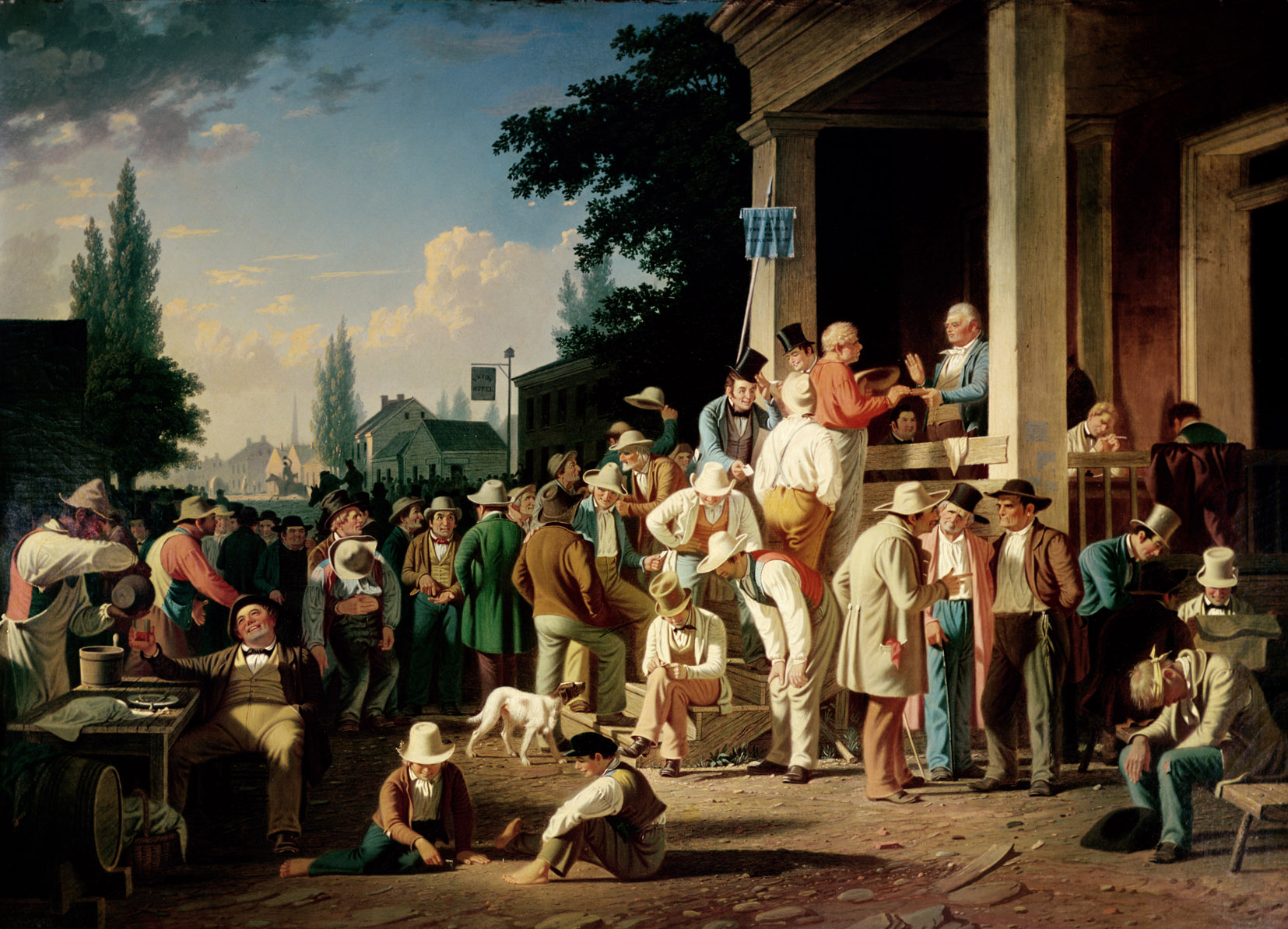
The County Election, by George Caleb Bingham, 1851–1852. Saint Louis Art Museum, Missouri.
When he stood for reelection in 1864, the New York Herald called the president “a joke incarnate. His election was a very sorry joke.” Political cartoons ridiculed him for greeting any situation, no matter how grave, with “that reminds me of story…” Critics said that he wasn’t serious enough to be president and that his presentation was too common, but as president, Abraham Lincoln had a remarkable ability to connect with people and to talk to them through his own humble experience. Always unpretentious, he used his humor to embrace his origins and turn them to a political advantage, saying, “I don’t know who my grandfather was, and I am much more concerned to know what his grandson will be.”
There is an academic field of humor studies, made up of scholars from across the arts and sciences, with entire journals and conferences and endless arguments about what makes a joke funny. In the fray, three theories of humor dominate. The superiority theory, favored by Plato, Aristotle, and Thomas Hobbes, holds that we laugh at things that we feel are beneath us or grotesque—the joy we find in schadenfreude. The relief theory, favored by Sigmund Freud, argues that when there is a build up of nervous excitement or psychic energy, it must be released through laughter, tears, dreams, or physical action. Aristotle, Cicero, Immanuel Kant, and Arthur Schopenhauer were proponents of incongruity theory, which posits that we find amusement when an action differs from our expectations, but in a way that does not cause us harm. Think of Mel Brooks’ definition: “Tragedy is when I cut my finger. Comedy is when you fall into an open sewer and die.” These three theories overlap, are contradictory, and leave out a great deal. Yet, they can help explain part of the appeal of George W. Bush’s joke from the unveiling of his portrait at the White House. He said to President Obama, “When you are wandering these halls as you wrestle with tough decisions, you will now be able to gaze at this portrait and ask, What would George do?”
It is not enough for politicians to amuse; they must also persuade, for their benefit and ours. Gorgias, a fifth-century-BC Greek philosopher and rhetorician, urged orators to “destroy one’s adversaries’ seriousness with laughter, and their laughter with seriousness.” Aristotle treated humor briefly in The Rhetoric; he quoted Gorgias’ advice and also warned that “mockery is more gentlemanly than buffoonery; for the mocker makes a joke for his own amusement, the buffoon for the amusement of others.” Cicero in On the Orator identified the strategic value of humor as securing goodwill, demonstrating cleverness, and attacking an opponent. In his Education of the Orator, Quintilian recognized that humor could be used to relieve tension, divert attention, refresh the audience, and deflect criticism. He also argued that Demosthenes simply lacked a sense of humor and that Cicero joked too much. The ancient orators’ contemporary political counterparts on this account might be the dour Richard Nixon (“Sock it to me?”) and the inveterate joker, Lincoln.
Humor and rhetoric are inextricably linked to democracy in its most ancient form. But in a democratic system with an electorate, juries, senates, representatives, legislatures, and executives, the subtleties of persuasion are both the game and the field on which it is played. Our leaders must be able to withstand ridicule and use it as a weapon. As much as the powerful seem distant from their public, politicians must still face the people for their vote. Humor is a shortcut to identification and connection, humanizing bureaucracy and circumventing reason. If we laugh at the same joke, it is likely that we may share other sensibilities. If politicians can make us laugh, we can spin a fantasy that they’ll also govern in a way we like.
Rhetorical humor is persuasion with a wink. It lets the citizens in on the political performance. The connection that we feel with a politician through their rhetoric is, of course, an illusion, but our amusement makes us accepting of that. Unlike a frontal assault of facts and evidence, a political joke can feel more like a shared secret. It is much easier for the audience to remember, and repeat, a pithy phrase or a humorous line than a well-reasoned but poorly stylized argument. A joke pushes past our rational defenses and gets at our instincts, persuading where facts fail. The laughter that accompanies humor forces us to lose control of our bodies and our reason, to suddenly like a candidate we’ve been conditioned to hate, even just for a moment. Two-time Democratic presidential candidate Adlai Stevenson said, “I would hate to think that humor is, in the long run, more effective than reason, but it certainly is more arresting than reason.”
Unlike Lincoln, John F. Kennedy knew who his grandfather was, and also his grandfather’s son. During a speech at the Gridiron Club dinner in March 1958, Kennedy, running for reelection to the Senate, pulled a piece of paper from his suit pocket that he said was a telegram from “my generous daddy.” He read, “Dear Jack: Don’t buy a single vote more than is necessary. I’ll be damned if I’m going to pay for a landslide.” Joseph Kennedy Sr. wielded considerable political power, and critics charged that his son stood to be the beneficiary of his influence. The telegram allowed JFK to deflect the charges of nepotism, and it demonstrated that the young Kennedy was talented and capable enough to have the confidence to laugh about a sensitive subject.
The joke was no off-the-cuff remark. Ted Sorensen wrote that Kennedy prepared the speech for hours, that “in his eight years in the Senate, no speech assignment worried him longer or more deeply than his role as Democratic jester for the Washington Gridiron Club Dinner in 1958.” Kennedy won reelection, and two years later, the White House. No logical argument for the spoils of wealth would have worked. During his 1960 campaign, he traveled around the country in a private plane, still something of a novelty at that time in American politics, all paid for by his father, who also footed the bill for television and radio ads and staff salaries. Kennedy may not have persuaded anyone that his father did not have tremendous influence, but perhaps he did succeed in getting the members of the Gridiron to like him a bit more, and he gained the respect of a tough audience for being able to laugh at himself.
As president, JFK was a quick wit, responding to criticism or attacking an opponent with rhetorical ease. He was the first president to broadcast live press conferences on television, using the platform to speak directly to the American people and often deploying humor to drive home a point. Sometimes during a briefing, as he thought of a witty response to a question, the president’s lip would twitch while waiting for the reporter to finish. When it was time to deliver the punch with a knockout smile, the president often looked down afterward, almost embarrassed that he had made a joke, but always laughing along with the press corps. Kennedy was a television star more than any other politician of his time and his polished, quick humor served as an example to others who sought his office, including an actor at the beginning of his political career, Ronald Reagan.
It was Reagan who was responsible for what may be the most memorable and effective example of American political humor. On October 21, in the Municipal Auditorium in Kansas City, the second debate of the 1984 presidential election was held between the incumbent Reagan and former vice president Walter Mondale. Reagan had performed poorly in the first debate, seemingly confused and at a loss for words. Mondale was trailing badly in the polls and a strong performance was his only chance to gain ground. Mondale later told Jim Lehrer, “I think the public wanted to vote for Reagan, which they later demonstrated…The only thing that was going to give me a chance was a feeling that he was losing the full mastery of the presidency.”
It was debate panelist Henry Trewhitt of the Baltimore Sun who brought up a sensitive subject for Reagan: the former actor was already the oldest president in history. Trewhitt recalled that Reagan appeared tired in the first debate, and alluding to Kennedy’s sleepless attention during the Cuban Missile Crisis, he asked President Reagan, “Is there any doubt in your mind that you would be able to function in such circumstances?” Reagan, with a serious look that slowly developed into a smile, replied, “Not at all, Mr. Trewhitt, and I want you to know that also I will not make age an issue of this campaign. I am not going to exploit, for political purposes, my opponent’s youth and inexperience.” The audience, fifty-six-year-old Mondale included, laughed heartily as Reagan took a long drink of water.
By employing a paralipsis, a rhetorical figure of mentioning something—in this case an opponent’s flaw—by pretending to pass over it, Reagan took an issue that could have been very damaging and deftly brushed it aside. Mondale conceded in a 1990 interview, “He got the audience with that, yeah. I could tell that one hurt…That was really the end of my campaign that night.” In the first debate, Reagan failed miserably at using facts to make the case that he deserved a second term, but the American people weren’t listening for facts to persuade them. Reagan’s witty aside led voters to the conclusion that he was a confident president, and it helped him win forty-nine states in a historic landslide.
The line was good, but was it truly Reagan’s? We simply do not know the authorship of most political humor. Few politicians have the skill to come up with a witty response in a debate, press conference, or interview, and even then, they might have prepared the humor in advance or had it written for them. Reagan claimed that he thought of his retort in the moment: “My answer to the question just popped off the top of my head. I’d never anticipated it, nor had I thought in advance what my answer might be to such a question.” But one of his strategists, Richard Wirthlin, recalled some years later that the line was Reagan’s but that he thought it up in advance of the debate—“Don’t worry, Dick. I’ve got a way to deal with that question, and I’m just waiting for it to come up.”
Even if Reagan wrote the line himself, he relied on speechwriters for most of his rhetoric, including his humor. He was hardly the first president to do so. Alexander Hamilton, James Madison, and John Jay not only wrote The Federalist Papers under the name Publius, they also helped President Washington with many of his speeches. Warren G. Harding hired the first of many full-time White House speechwriters, whose numbers increased along with the demand for presidential speeches in the media age. Despite the great talent of many White House speechwriters, presidents often sought out additional help for crafting humor. Liz Carpenter, press secretary to Lady Bird Johnson, was widely known to be very funny and created the White House Humor Group to help LBJ with jokes for his speeches. Robert Orben started his career writing comedy for Dick Gregory and Red Skelton and eventually found his way to serving as director of speechwriting for President Ford. Mark Katz, a humor writer who worked in Democratic politics, was not on the regular White House staff but would get brought in to write comedy for White House Correspondents’ Association Dinner speeches for President Clinton.
Rhetorical humor that is written in advance may lack the charm of the perfect bon mot but probably stands a better chance of being both funny and persuasive. Richard Nixon, not one of our most strategically humorous presidents, claimed that “no TV performance takes such careful preparation as an off-the-cuff talk.” Even accomplished humorist-politicians have given careful thought to their apparent flashes of brilliance. Winston Churchill’s son Randolph said that his father had “spent the best years of his life writing his extemporaneous speeches.”
Reagan, Kennedy, and Lincoln had radically different styles, but all had bold senses of humor—public-opinion polls seeking to identify the best presidents frequently place these three at the top of the list. Lincoln’s wit, like his background, was raw and rough-hewn, cobbled together out of colloquial bits and pieces he read and heard. Kennedy’s was well-polished, carefully considered, expertly packaged and delivered. That he could make it look effortless, at press conferences and on television, was part of the act. Reagan’s humor combined the two. Like Lincoln, he did not have the pedigree or Ivy League education, but as with Kennedy, much of his humor was planned in advance and carefully considered. It was folksy, but it was a Hollywood brand of folksy—it worked as long as he stayed on script.
We want our politicians to be authentic, or at least to have the appearance of authenticity, but every stump speech, debate, and Rose Garden statement is tainted with suspicion. “Sincerity is the most important thing. Once you can fake that you’ve got it made.” (It’s hard to say who gets credit for this quotation. It is variously attributed to Oscar Wilde, George Burns, and the great comedian himself, Ronald Reagan.) Prepared political humor may be inauthentic, but that doesn’t mean it can’t be effective. In The Rhetoric, Aristotle refers to inartistic and artistic proof. Inartistic proof includes resources that a speaker can use to support an argument which they do not create such as laws, contracts, and testimony. Artistic proof includes ethos, logos, and pathos—credibility, logical argument, and emotion—the ingredients of rhetorical humor.
The maxim “It’s funny because it’s true” rarely holds up to scrutiny; the truth is rarely funny and the funny is rarely true. Humor often involves lying, exaggeration, and invention, but it is a kind of permitted lying. If a politician uses the content of humor to lie to us, we are more accepting of it because we are in on the joke. We know that they are not telling us the whole truth or an inkling of the truth—and they know that we know. This semantic and pragmatic dance of political speech keeps us tuned in, even as we complain of being turned off by the whole show.
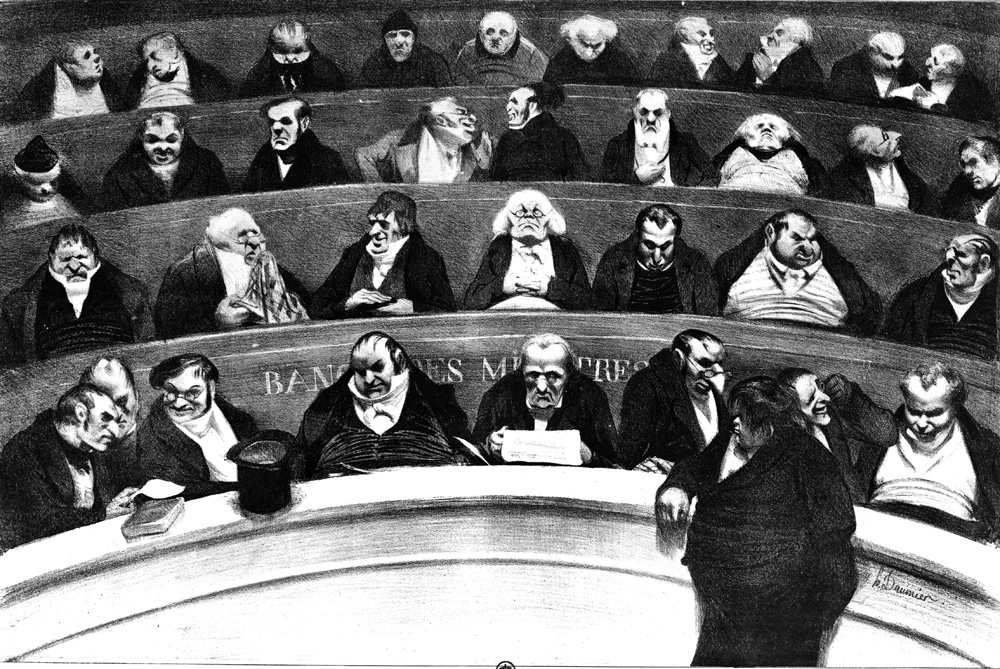
The Legislative Belly, by Honoré Daumier, 1834. The Metropolitan Museum of Art, Rogers Fund, 1920.
Given the complexity of politics and the impossibility of determining voters’ true motivations, it is difficult to claim that any example of political rhetoric directly leads to a specific effect. But politicians whose jokes fail suffer deafening silence and possibly a career in tailspin. In 1983, U.S. secretary of the interior James Watt mocked the value of affirmative action, saying of a coal-leasing panel in his department, “I have a black, a woman, two Jews, and a cripple. And we have talent.” Reagan reluctantly accepted Watt’s resignation shortly thereafter. Hillary Clinton had two more years in the Senate before facing the voters after she made a joke about Mahatma Gandhi at a fundraising event for Nancy Farmer, the 2004 Democratic Senate candidate in Missouri. “As I introduce her, I want to end with her favorite quote, because I love this quote. It’s from Mahatma Gandhi. He ran a gas station down in St. Louis for a couple of years…Lotta wisdom comes out of that gas station. No, Mahatma Gandhi was a great leader of the twentieth century. ‘First they ignore you, then they laugh at you, then they fight you, then you win.’” After replays of the sound bite and criticism for what appeared to be racial stereotyping, she apologized for her “lame attempt at humor.” Farmer lost the election, but Clinton fought for her Senate seat two years later and survived.
The seemingly natural wit of the candidate, and the charming apology after the tasteless gaffe, has for many years been expected and required in American politics. Today it is the norm to find candidates and sitting presidents on late-night television. The trend is often credited to Bill Clinton’s 1992 interview and jam session on The Arsenio Hall Show, but politicians had taken to television as soon as it was invented. On March 8, 1963, Richard Nixon played his own composition for the piano on The Jack Paar Program, quipping “The Republicans don’t want another piano player in the White House,” a dig at Harry Truman, who had also been featured in a scripted skit on The Jack Benny Show in 1959. Both Kennedy and Nixon appeared on Jack Paar’s Tonight Show during the 1960 presidential campaign. The interview with Kennedy largely consisted of standard campaign rhetoric, though Paar did ask if he had any amusing stories to tell. Kennedy replied in his strong Boston accent, “I was made an honorary Indian, and I now cheer for our side on TV.”
Through the start of the broadcast era into the 1970s, most entertainment shows that featured politicians adapted to the seriousness of political discourse. Today the seriousness of political discourse has adapted to the demands of entertainment, much of it thanks to Saturday Night Live, which has played a significant role in late-twentieth-century American politics. Chevy Chase’s stumbling caricature of Gerald Ford created as indelible an image of the president in the public mind as Dana Carvey’s George H. W. Bush would in the 1980s and ’90s. Rather than remain the butt of the jokes, political figures quickly sought to take advantage of the reach of SNL. The first political host of SNL was Ford’s press secretary Ron Nessen in 1976. Several once and future presidential candidates hosted the show, beginning with Ralph Nader in 1977 and continuing with, among others, George McGovern, Jesse Jackson, Rudy Giuliani, John McCain, Al Sharpton, and Al Gore. Numerous others have made cameos as they sought office.
Presidential candidates can count on being asked to appear on SNL as the election draws near. Accepting the invitation allows them to appear magnanimous, standing with those who have mocked them. Now that SNL has become an institution itself, one has to wonder if they pull their punches a little, knowing that their target may soon be their guest. Before the 2000 election, the sketch parodying the first Bush-Gore debate crystallized the images of the candidates. For all the speeches and ads, we were down to the choice of the dim-witted “strategery” and the pushy “lockbox.” The Gore team reportedly made their candidate watch the skit and made changes in his delivery based on the parody. Bush and Gore performed self-caricatures on an SNL political comedy special two nights before the 2000 election, and the next day they made the rounds of the morning and late-night talk shows. The final barnstorming of the campaign was not fiery rhetoric before an adoring crowd, but knowing banter performed for the home viewer.
On The Daily Show, Jon Stewart has interviewed one sitting president (Obama), two former American presidents (Clinton and Carter), one former vice president (Gore), and dozens of senators, representatives, and governors. Many of these guests planned on being the next president of the United States and one, John Edwards, announced his candidacy on the show. By the time of the 2008 presidential election, The Daily Show was seen as an important venue for political discourse with many of the Democrats and a few of the Republicans stopping by. Hillary Clinton appeared on the show just before the Ohio and Texas primaries in 2008. Stewart asked, “Tomorrow is, perhaps, one of the most important days of your life. And yet you have chosen to spend the night before talking to me. Senator, as a host, I’m delighted. As a citizen: frightened. Your response?” “Pretty pathetic,” replied Clinton, who won both primaries the next day.
If you must take care that your opinions do not differ in the least from those of the person with whom you are talking, you might just as well be alone.
—Yoshida Kenko, 1330The paradox of democracy is that we elect someone on the basis of being just like us and then criticize them for not being better than us. To be elected as a political leader in a democracy is to occupy three positions relative to the other citizens: they must be better than us, for they must lead us; they must be less than us because they err greatly and publicly; and they must be one of us, a citizen among their peers. Comedy can be a way of coping with such conflicting roles; rhetorical humor is a tool to help master them.
We elect and follow leaders partly on the basis of their ability to effectively deliver the scripts laid out for them. Lincoln, seemingly a long shot for greatness, charmed with his down-home stories. Kennedy knew that it would be useless to recast himself as an everyman, but reduced his distance from the masses by joking about it. Reagan, who auditioned to play the president in The Best Man in 1959 but didn’t get the part, eventually found that it was easier to play the jovial leader in real life.
In a democracy, choosing our leaders turns out to be not very different from choosing our mates. We find people attractive with whom we share a worldview and an understanding of our backgrounds and beliefs. And we want someone who can make us laugh. It cuts through our planning, expectations, and calculations. The ridiculous overwhelms the reasonable and gives us one of the few authentic experiences in political rhetoric: it truly moves us. In that moment of laughter, what Thomas Hobbes called a “sudden glory,” we feel connected to a democracy that too often leaves its people feeling powerless.
